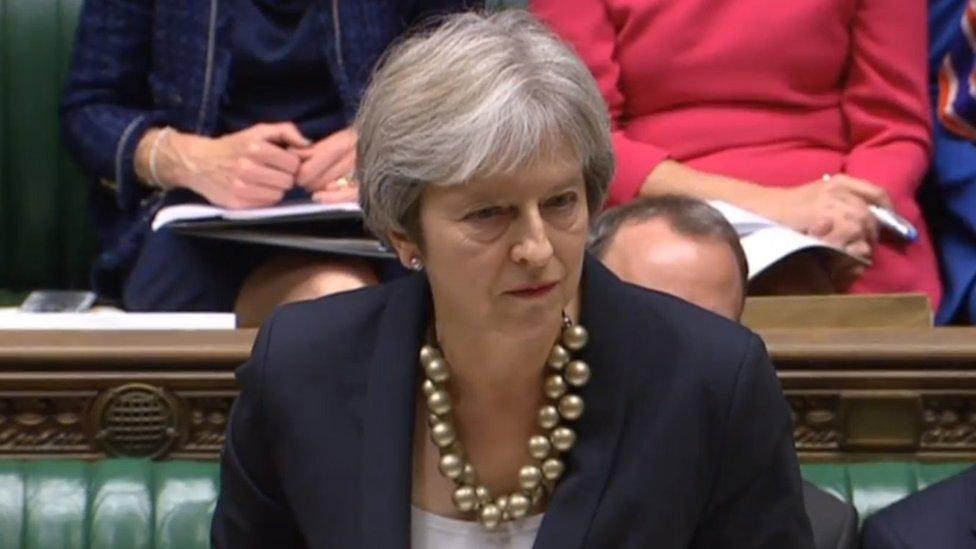Theresa May: 'Be careful about language' on Brexit
- Published

The PM was told to "bring her own noose" to a meeting with her own backbenchers later this week
Theresa May called on politicians to be "careful about language" they use after words directed at her over Brexit.
In an article in the Sunday Times, external, a Tory backbencher was quoted as saying: "The moment is coming when the knife gets heated, stuck in her front and twisted. She'll be dead soon."
The PM was also told to "bring her own noose" to a meeting later this week.
Mrs May acknowledged "passionate beliefs" on Brexit, but said those in public life should watch their words.
MPs from all sides have condemned the quotes, with Conservative MP Sarah Wollaston calling those responsible "spineless cowards", adding: "Have they learned nothing following the assassination of Jo Cox?"
Labour MP Mrs Cox was murdered in her West Yorkshire constituency by right-wing extremist Thomas Mair, a week before the Brexit referendum in June 2016.
Fellow Conservative MP Heidi Allen told BBC 2's Politics Live that whoever said it is "worthy of having the whip removed and being thrown out the party".
Heidi Allen: "For me, it is worthy of having the whip removed and being thrown out of the party."
In a debate in the House of Commons on Monday to update MPs on the latest progress on the Brexit negotiations, Labour leader Jeremy Corbyn said he hoped it would be conducted "without some of the language reported in the press over the weekend."
In response, Mrs May said: "I think it is incumbent on all of us in public life to be careful about the language we use.
"There are passionate beliefs and passionate views held on this subject [Brexit] and other subjects.
"But whatever the subject is, we should all be careful about our language."
Kinder politics? 'We’re back to square one’ says Jo Cox's sister
SNP leader Ian Blackford also used some of his time in the debate to criticise the language, calling it "crass and violent", as well as "abhorrent and irresponsible".
He added: "Those responsible need to withdraw and apologise. Such language has no part to play in our public discourse."
'Vile and dehumanising'
Labour MP Yvette Cooper, chairwoman of the Commons Home Affairs committee, said the unnamed backbencher who made the comments should be publicly named to stop them from doing it again.
"This is vile and dehumanising language towards a woman MP, towards a prime minister who, no matter how much you might disagree with her, is someone who is doing a job in public life," she said.
"Nobody should be subject to that kind of violent language, which I think is normalising violence in public debate at a time when we lost Jo Cox, we have had threats against Rosie Cooper, we have had other violent death threats against women MPs."
Anonymous critic of Theresa May is a 'bloody idiot', says MP
Scotland's First Minister, Nicola Sturgeon, also condemned the use of language:
Allow X content?
This article contains content provided by X. We ask for your permission before anything is loaded, as they may be using cookies and other technologies. You may want to read X’s cookie policy, external and privacy policy, external before accepting. To view this content choose ‘accept and continue’.

Asked on BBC Radio 4's Today programme about the language, Brexit-backing Conservative MP Mark Francois said it was "unacceptable", but that he would not tell Chief Whip Julian Smith how to do his job.
Instead, he criticised a "bunker mentality" in Downing Street, adding: "The problem is that there is a lot of frustration on the backbenches at the moment, both among Leavers and Remainers, at the general state of play.
"When you try to convey that to No 10, no-one is listening."
This led to a fresh wave of criticism from his colleagues, including Remain-backing Tory Anna Soubry.
Allow X content?
This article contains content provided by X. We ask for your permission before anything is loaded, as they may be using cookies and other technologies. You may want to read X’s cookie policy, external and privacy policy, external before accepting. To view this content choose ‘accept and continue’.

Fellow Brexiteer Tory Andrew Bridgen said the language was "unhelpful" and warned his Leave-supporting colleagues that it risked increasing support for Mrs May.
He told ITV's Good Morning Britain: "At the moment that [language] is unhelpful. It won't persuade colleagues to back a change of leadership.
"It's actually going to be counterproductive at this point."
Asked how Theresa May viewed the use of such language, her official spokesman said: "I don't intend to dignify those specific anonymous comments with a response.
"The prime minister has always been very clear that we must set a tone in public discourse that is neither dehumanising nor derogatory.
"Personal vitriol has no place in our politics."
- Published16 October 2019

- Published30 December 2020
